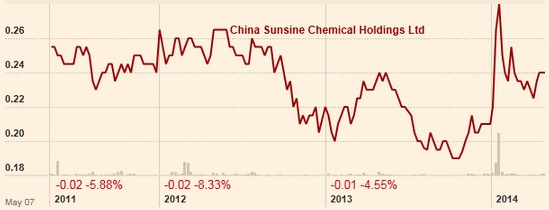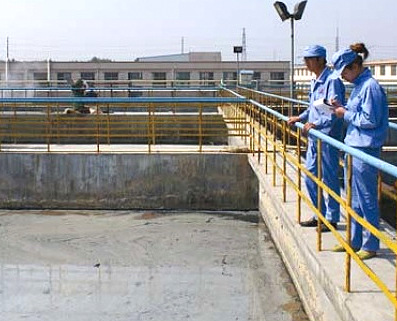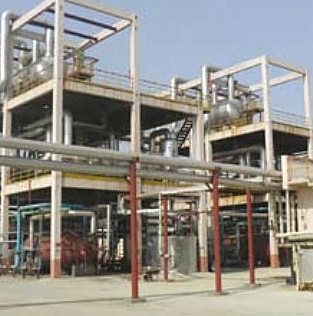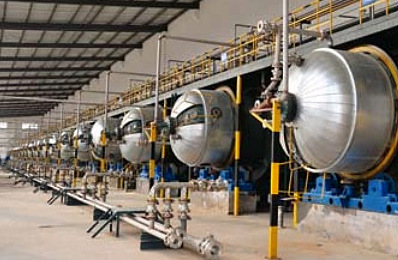'Portuser' contributed this article to NextInsight.
China Sunsine Chemical reported a 95% rise in its 1Q net profit to RMB22.8 million with an expansion of gross margin.
It also stated that a number of rubber accelerator factories have suspended operations on government orders for not complying with environmental requirements.
Here are some key elements of Sunsine's business, its evolution, and new game-changing fundamentals.
 Sunsine (24 cents) trades at a trailing PE of 7.2 and a dividend yield of 4.26%. Market cap is S$116 million. Chart: FT.com
Sunsine (24 cents) trades at a trailing PE of 7.2 and a dividend yield of 4.26%. Market cap is S$116 million. Chart: FT.com
To start with, Sunsine produces rubber accelerators which are chemicals that shorten the time sulphur reacts with rubber to improve the physical properties of rubber products.
Tyre manufacturing consumes more than half of the world’s output of both natural and synthetic rubber. Tyres, and rubber accelerators, used to be produced in the West and Japan alongside car manufacturing.
China is now a major car as well as tyre manufacturing country because of its rising domestic car ownership and lower production costs.
As the technology of making rubber accelerators is simple, many accelerator factories have sprung up in China to serve tyre factories and producers of other rubber products. Result: surplus production capacity.
Pollution
The production of rubber accelerators is pollutive, generating wastewater and hydrogen sulphide (a toxic gas). Many accelerator factories in China have not invested enough in pollution controls, however.
In 2008, a large accelerator factory in Tianjin (about 100 km from Beijing) was ordered to suspend its operations so as not to affect the air quality of Beijing during the summer Olympics.
Early installation of waste treatment facilities
 Sunsine's water treatment facility.
Sunsine's water treatment facility.
Photo: annual reportWhen it was founded in 1998 to produce rubber accelerators, Sunsine took waste treatment seriously.
Sunsine’s manufacturing processes use less water than many of its peers, and wastewater is treated to acceptable levels for discharge into rivers.
Last year, the company took the extra step of further treating some wastewater for reuse, cutting down its demand for tap water.
In addition, through chemical reaction, Sunsine converts toxic hydrogen sulphide into sulphur (for reuse as a raw material) and steam (for drying rubber accelerators), and reduce chimney emission.
 Plant for converting toxic hydrogen sulphide into sulphur for use as raw material. Photo: annual reportIn 2003, Sunsine won its first ever accreditation from a global tyre maker, Bridgestone, the world’s largest. Now, 45 of the world’s largest 75 tyre firms are its clients.
Plant for converting toxic hydrogen sulphide into sulphur for use as raw material. Photo: annual reportIn 2003, Sunsine won its first ever accreditation from a global tyre maker, Bridgestone, the world’s largest. Now, 45 of the world’s largest 75 tyre firms are its clients.
Renowned tyre makers undertake thorough evaluation to ascertain that the accelerator makers vying for accreditation observe clean production processes and are reliable in their supply.
Accelerator capacity expansion
After raising RMB 260m from its IPO in Singapore in 2007 (stock price was 39c at 10.8 times 2006 profit of RMB 63m), Sunsine grew its accelerator capacity, from 26,000 tonnes to 75,000 tonnes now, to become the world’s largest accelerator producer.
Two-fifths of its output is exported.
After establishing a foothold in accelerator production, the company ventured into producing three other rubber chemicals -- insoluble sulphur (IS), TMQ and 6PPD.
Coping with competition
Although Sunsine’s accelerators are of superior quality produced from clean processes, the company faced price competition from rivals who skimped on pollution control.
To boost sales, Sunsine cut the selling price of its accelerators by some RMB 1,500 per tonne to RMB 19,600 in 4Q 2011. The selling price stayed at around RMB 18,500 for the next two years, only to rebound in 1Q 2014 to RMB 19,300 when some rubber accelerator companies suspended production on government orders.
Sunsine’s early investment in green processes is now paying off. All accelerator factories will now have to spend on waste treatment and the cost advantage for not doing so is gone.
|
Balance sheet Sunsine's massive capacity expansion has not weakened its financial position. A new accelerator production line was added only after overall utilisation had hit a high level and enough internal funds had been accumulated to keep debt financing manageable. |
Provision of central heating
Sunsine’s older production base in Shanxian is in the Shanxian Chemical Industrial Zone. Factories there own small coal-fired boilers to generate steam for heating.
The production of high-pressure steam from a larger boiler to generate electricity and steam consumes less coal.
The Government has mandated that individual boilers in the industrial zone will be scrapped; Sunsine will operate large high-pressure boilers to sell steam to all factories in the zone. This signifies the Government’s resolve to minimise pollution caused by coal burning.
Besides lower energy cost to Sunsine, the project may become a profit centre as steam tariff will be levied at market rates and prepaid.
Profit and loss statement
Although its balance sheet has remained strong, the price reduction of accelerators in 4Q 2011 hurt profitability.
From its peak of RMB 115m in 2010, Sunsine's profit dipped to RMB 99m in 2011 and plunged to RMB 32m in 2012, only to recover to RMB 77m in 2013 and RMB 23m in 1Q 2014 (against RMB 12m the year before).
Capacity building was another contributing factor to the profit decline.
In 2012, Sunsine completed the construction of its second production base at Weifang, which is near Qingdao port, to expand accelerator output and reduce logistic cost of exports. (Shanxian, where the older production base is sited, is an inland town.)
The Weifang base, built for RMB 100m to cater for an ultimate output of 50,000 tonnes of accelerators, is now producing 14,000 tonnes only but bearing the depreciation and running cost of the common infrastructure in full.
When new lines are added to relieve the shortage caused by the suspension of several accelerator factories, a good portion of the revenue from their output will flow to the bottom line.
Another big-ticket item was the setting up of the 6PPD production facilities with a RMB 200m budget. (6PPD is a high-grade anti-oxidant that prolongs the lifespan of rubber products by reducing the harmful effects of heat and oxidation.)
Sales of this newly-introduced product, which started in 2012, have been slow as tyre manufacturers want to be certain of its efficacy. This product is likely to be loss-making because of high fixed costs, and will be profitable only when its sales volume reaches a reasonable level.
TMQ and insoluble sulphur took time to gain recognition
For perspective, it took five years before utilisation of the 10,000-tonne TMQ facilities (a lower-grade anti-oxidant) reached a reasonable level in 2013.
 Sunsine's new insoluble sulphur plant in Dingtao will elevate the company to become China's largest producer of insoluble sulphur.
Sunsine's new insoluble sulphur plant in Dingtao will elevate the company to become China's largest producer of insoluble sulphur.
Photo: annual reportIt also took a long time for Sunsine’s insoluble sulphur (IS) to gain market recognition.
IS replaces ordinary sulphur in high-temperature applications. The technology of making high-grade IS is held by Flexsys, and China is a net importer of IS.
Through collaboration with a local university, Sunsine has developed its own quality IS and began selling the product in 2007 from its 10,000-tonne plant in Shanxian. It took five years for sales to reach 10,700 tonnes in 2012 (and 11,900 tonnes in 2013).
In 2013, Sunsine completed building a 30,000-tonne IS factory in Dingtao (near Shanxian) and installation of the first 10,000-tonne line. When this line begins production in 2Q 2014, Sunsine will be the largest IS producer in China.
Recent story: CHINA SUNSINE: Getting ahead through environment-friendly efforts







Is it going to turn out like some other S-chips?
no market interest whatsoever...